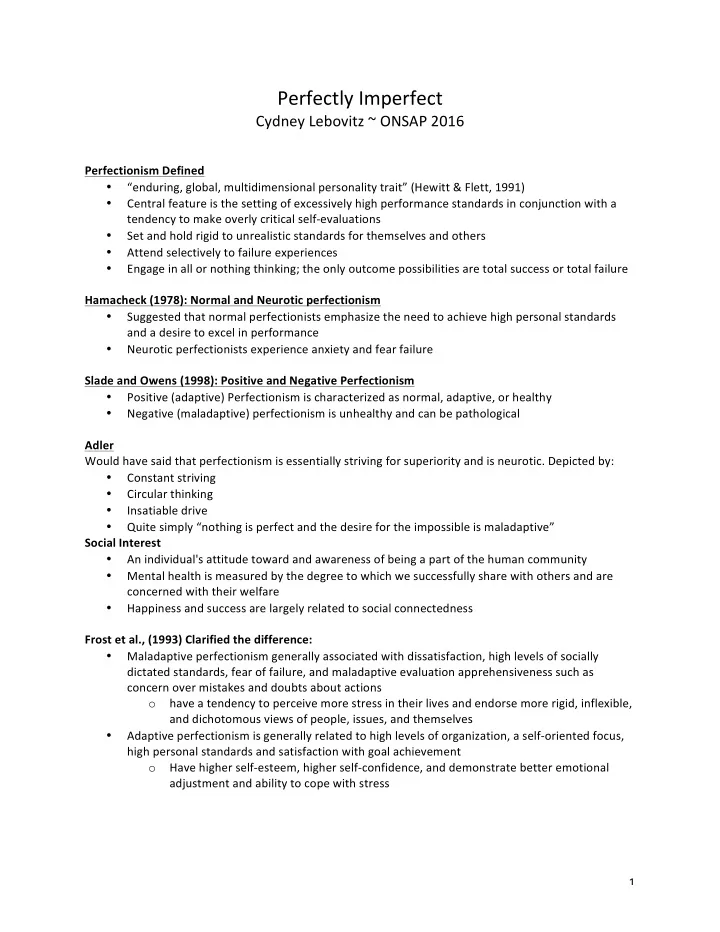

Perfectly Imperfect Cydney Lebovitz ~ ONSAP 2016 Perfectionism Defined • “enduring, global, multidimensional personality trait” (Hewitt & Flett, 1991) • Central feature is the setting of excessively high performance standards in conjunction with a tendency to make overly critical self-evaluations • Set and hold rigid to unrealistic standards for themselves and others Attend selectively to failure experiences • Engage in all or nothing thinking; the only outcome possibilities are total success or total failure • Hamacheck (1978): Normal and Neurotic perfectionism • Suggested that normal perfectionists emphasize the need to achieve high personal standards and a desire to excel in performance Neurotic perfectionists experience anxiety and fear failure • Slade and Owens (1998): Positive and Negative Perfectionism Positive (adaptive) Perfectionism is characterized as normal, adaptive, or healthy • Negative (maladaptive) perfectionism is unhealthy and can be pathological • Adler Would have said that perfectionism is essentially striving for superiority and is neurotic. Depicted by: • Constant striving • Circular thinking Insatiable drive • • Quite simply “nothing is perfect and the desire for the impossible is maladaptive” Social Interest An individual's attitude toward and awareness of being a part of the human community • Mental health is measured by the degree to which we successfully share with others and are • concerned with their welfare • Happiness and success are largely related to social connectedness Frost et al., (1993) Clarified the difference: Maladaptive perfectionism generally associated with dissatisfaction, high levels of socially • dictated standards, fear of failure, and maladaptive evaluation apprehensiveness such as concern over mistakes and doubts about actions o have a tendency to perceive more stress in their lives and endorse more rigid, inflexible, and dichotomous views of people, issues, and themselves Adaptive perfectionism is generally related to high levels of organization, a self-oriented focus, • high personal standards and satisfaction with goal achievement o Have higher self-esteem, higher self-confidence, and demonstrate better emotional adjustment and ability to cope with stress 1
Hewitt & Flett (1991): 3 dimensions of Perfectionism • Self-Oriented Perfectionism: setting excessively high standards and motivation toward perfection for oneself o Considered positive or adaptive o Associated resourcefulness, assertiveness and conscientiousness o Consider intrinsic motivation, enhanced self-esteem and motivation to succeed o Feelings of control and mastery • Socially Prescribed Perfectionism: characterized by striving for excessively high standards perceived to be set by others ) o Considered negative or maladaptive o Associated with procrastination, depression, suicide ideation, lower self-esteem, anxiety, low personal control and shame o Consider extrinsic motivation, self-critical, excessive concern over mistakes • Other- Oriented Perfectionism: holding excessively high standards and expectations of others Measures of Perfectionism • Multidimensional Perfectionism Scale (Frost et al., 1990) o Measures both adaptive and maladaptive dimensions and includes 5 scales § Personal Standards (adaptive) Parental Expectations (adaptive) § Concern Over Mistakes (maladaptive) § § Doubts About Actions (maladaptive) Parental Criticism (maladaptive) § • Multidimensional Perfectionism Scale (Hewitt & Flett, 1991) o Takes a more interpersonal perspective and assesses 3 dimensions of perfectionism The Pathology of Perfectionism – the BIG 3 1. Depression 2. Anxiety 3. Eating Disorders Perfectionistic qualities in the Performance Domain “the need to perform in an excellent manner and attain satisfaction and a sense of pride is not perfectionism” (Flett and Hewitt, 2006) • Positive and adaptive perfectionism associated with achievement of goals and confidence in sport Healthy perfectionism correlated with high personal standards along with low concern over • mistakes, parental criticism, and doubts in gifted children Performance Perfection (Mainwaring, 2009) “performers who strive for perfection but do not necessarily present with pathology” • Mainwaring feels that though the descriptors “healthy, positive and adaptive” designate positive functioning, they still imply that pathology is present She feels that goal-directed behaviour, striving for self-enhancement, and motivation for • proficient execution of skilled performance are positive and appropriate pursuits when considering high-performance domains of functioning But this begs the question… are levels of such high performance healthy in the first place? • 2
Working with Perfectionistic Clients in the Performance Domain Goal assessment: is the goal realistic and the desire not driven by pathology? • Appropriateness: is the client’s need for perfection appropriate in the given situation? Assist in • reshaping thoughts, feelings goals, or expectations (CBT style) • Clinical vs. Performance-focused approach: is the pursuit of an ideal performance accompanied by unrealistic expectations, overly critical self-evaluations, anxiety or an inability to learn from experiences? Performance-related concerns may reveal more complex, clinical challenges and may require • psychotherapeutic-oriented interventions. Determine whether client’s issues arise from a personality rooted in perfectionism Perfectionists expect much from their therapists! Maintaining therapeutic alliance while • managing transference is essential with perfectionist clients Stress and the Optimal Level of Arousal (Yerkes-Dodson Law, 1908) Emotional Regulation The attempt to control affect and find the optimal level of arousal • Finding the optimal level of arousal is far more difficult for Socially Prescribed Perfectionists as • they are greatly influenced by their environment and people around them • Physiological tools such as deep breathing exercises and imagery can produce a physical response that has a positive effect on regulating emotion 3
Recommend
More recommend